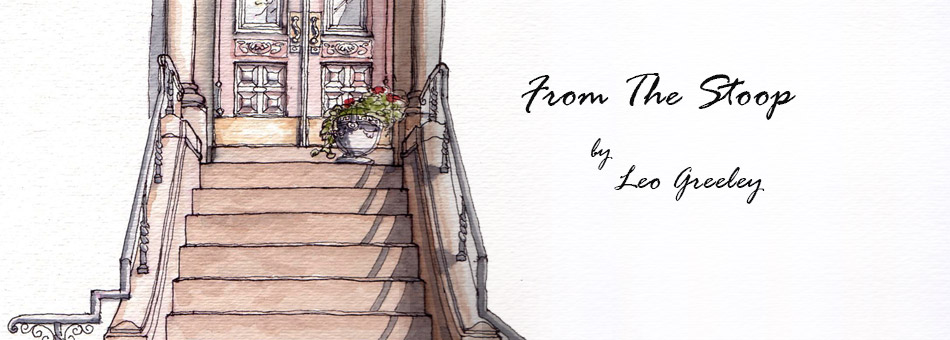From the Stoop-May2014
Ah, springtime on the stoop. Days when the suns warmth and the sweet smells of flowers blossoming fills the air. People are starting to clear their lawns, unearth the sheltered bushes and smile at the green tips of tulip leaves popping through the thawed soil.
Everything is perfect it seems. But is it? There is a shadow behind the old pallet leaning against the garbage cans outside of the bakery on the corner. Leaning forward, my wicker chair creaking, I can just barely make out the face of a scraggly little dog. Obviously a stray from the matting of its coat but what caught my eye was its expression. His head is lowered below the line of its shoulder and stretched slightly forward. His brow is raised forming wrinkles on its forehead. His jaw is closed almost giving the illusion of pouting lips. Most of all, his eyes give such a convincing window of sadness.
The Arrogance of Homo sapiens!
The traditional Western scientific view is that animals are little more than unthinking, unfeeling biological machines, sharply distinguished from humans. Scientific studies are showing us that many animal species have rich emotional lives, complex social interactions and advanced cognitive powers. Some even have a sense of fairness, and of right and wrong. In 2012 a group of neuroscientists produced the “Cambridge Declaration on Consciousness”. It basically states that animals and humans are conscious and aware to the same degree as one another. The evidence calls for a new paradigm in our relationships with other creatures.
Humans are different because we have higher intellectual abilities—but being less intelligent doesn’t mean that you suffer less when you are mistreated. With intelligence comes the ability to mistreat more creatively or with implied reason. There is a hierarchy in terms of the grounds for believing that there is a capacity to suffer. With vertebrates these grounds are very strong. With invertebrates, for example insects, these grounds are often not so strong. As research examines the general field of animal cognition, we’re learning that improbable animals do rather amazing things. For instance, we used to think of man as the only tool-maker until Jane Goodall discovered that other animals use tools, too. New Caledonian crows are amazing tool users, for example.When a chimpanzee does something a bird can’t do, people don’t hesitate to say the chimpanzee is smarter than the bird. But when the bird does something the chimpanzee can’t do, no one says the bird is smarter than the chimpanzee.
Scientists have started to study fish. There is a lot of research now showing that fish are conscious beings. They are sentient beings. They feel pain. They’re very smart. They deceive other fish. They cooperate with other fish. They respond to morphine in exactly the same ways that we do.
While this highlights the need for a more compassionate relationship between humans and animals it also brings into focus the silent victim of mans need to provide protein substance for its overpopulated existence. While there is no increase in space to raise livestock, there is a need to produce an ever increasing quantity of meat products. In order to continue to feed a population of demanding eaters it is the animals who give up any resemblance of a life. There is no end to the atrocities committed against animals in the name of food and science. What is even more atrocious is that so many turn a blind eye towards it. I am never quite sure if it is indifference or acceptance. I have spoken in the past about the tremendous waste our fast food culture wastes on an hourly basis and there is no need to repeat the obvious but one interesting point is that very recently a winning court case supported and emphasized the claim that the ground beef in McDonalds hamburgers is not fit for human consumption not only because of the mechanical separation of cattle carcass to reclaim the left over meats but also because 70% of ground beef in North America was combined with ammonia nitrate to kill of bacteria. I deviate but point is there is not enough room to produce enough cattle to feed the fast food industry to the point that we need to serve what would normally be disposed of.
I challenge people to be aware of the road your animals take from birth to your table. Is it a humane journey and are you comfortable with it. Visit a humane society and differentiate between the natural games “pets “play and their obvious true emotions. Know the effect your choices have on your world. Is veal, foie gras, sharks fin, wild salmon worth the impact.
Back to the dog, my challenge is to gain a resemblance of trust so that I can get him to help. They are rather intuitive however.
